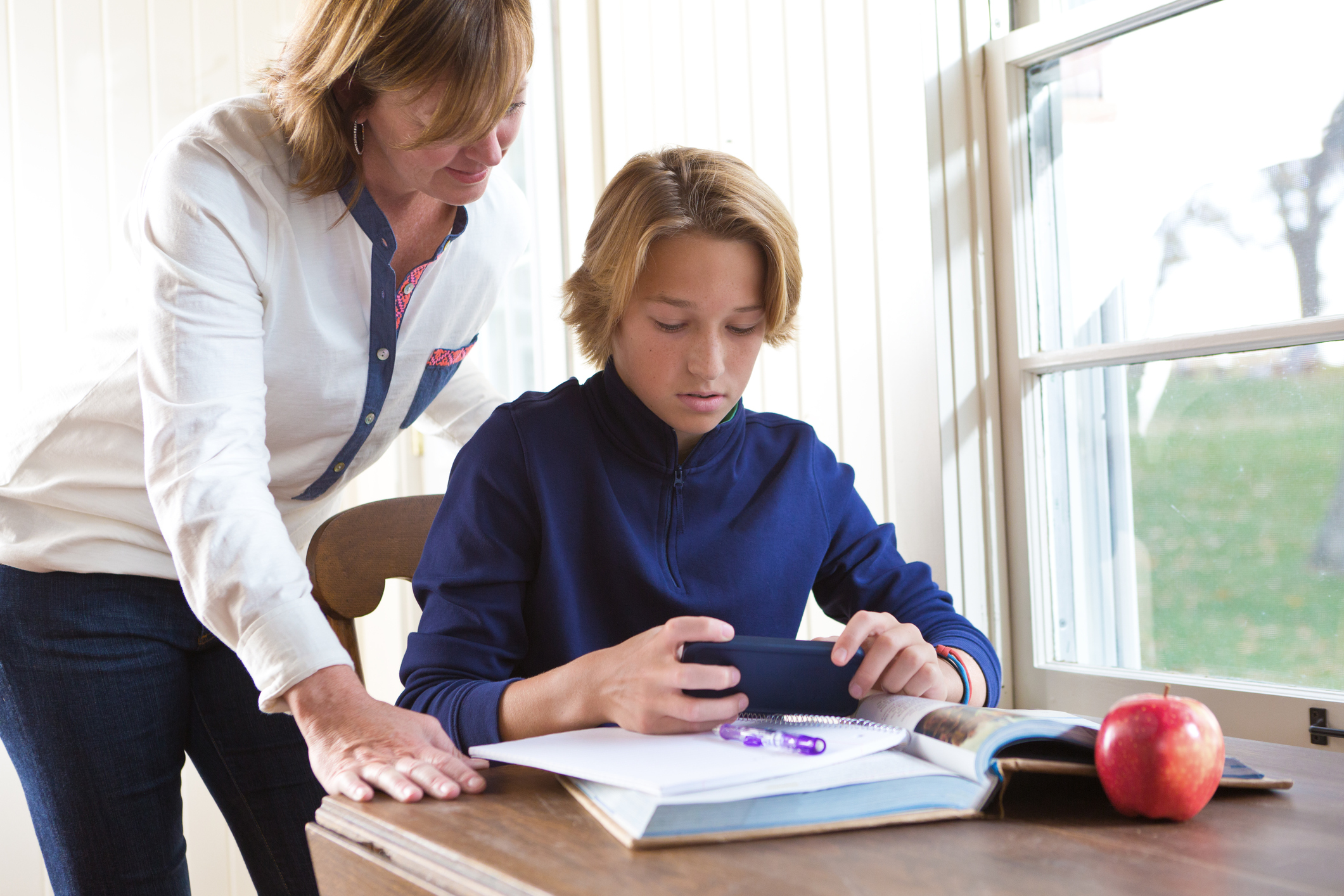Parents worry about how much adolescents use their smartphones and other media devices and how and with whom they are interacting. Children can encounter cyberbullying, sexting, and strangers online. Navigating how to parent in our digital world can be challenging: How do we keep our kids safer?
Dr. Rachel Young, Associate Professor in the University Iowa School of Journalism and Mass Communication, researches how social media and digital content affect health and wellness, including cyberbullying and online aggression. She sat down with us to talk about her latest research on adolescents’ perceptions of parenting styles. Dr. Young and her co-author, Dr. Melissa Tully, found that adolescents who said their parents had a more autonomy-supportive style (versus a controlling style) felt more comfortable discussing online experiences with their parents and reported fewer risky online experiences. She discusses what current research says about monitoring adolescents’ digital media use and taking away smartphones as punishment.
See an excerpt of Dr. Young’s interview.

What are some risky online experiences that adolescents can have online?
When we look at some risky online experiences, we’re really looking at the total of an adolescent’s experience online that might be more negative than positive. So, we’re talking about things like engagement in cyberbullying or online aggression, either as someone who feels victimized by aggression, or as someone who is being aggressive. We’re talking about encounters with strangers online, for instance, which might be something that has the potential to become more risky. And we’re talking about seeking out or encountering sexual content online, which has the potential to be risky or overwhelming depending on the age of the kids and their ability to process that type of experience.
What is autonomy-supportive parenting and how is it associated with positive (or better) outcomes for adolescents?
Autonomy supportive parenting isn’t necessarily permissive. It’s not saying, “Whatever you want to do is fine,” but it is parenting that acknowledges adolescents’ own views, desires, and attitudes, and takes time to discuss them when they are in conflict with a limit that the parent wants to set, for instance.
So with using media, autonomy-supportive parenting might set limits around things that the parent feels are important, but also then engage with the adolescent and talk about what media they’re using, why that media is important to them, and why they might push back on a limit or feel it’s not fair, or not in keeping with what their peers are doing. So, there would be a lot more room for connection through that type of conversation. Autonomy-supportive parenting, in general, has been connected with kids having more internal resources, like more self-esteem, and also less what we would call externalizing behavior: less acting out and less risky behavior in all sorts of ways.

What is controlling parenting and how is it associated with negative outcomes for adolescents?
Controlling parenting can take several forms. Control is really just about the parents exerting their will without any room for negotiation, reflection or conversation. So that can happen in a more verbally assertive way: “That’s it. We’re not talking about this.” It can happen through punishment so, “If you don’t do what I say, things are getting taken away,” again, without any kind of conversation about that necessarily, or without as much explanation as we’d see with autonomy-supportive parenting. But control can be also psychological, such as withdrawing of attention or affection based on the adolescent’s behavior.
With controlling parenting, whether that’s psychological control or other types of control, we do see that this type of relationship leads to less disclosure from the adolescent and leads to more acting out and is opposite of what we see with autonomy-supportive parenting. The adolescent may not want to bring the parent into their world or tell them what they’re doing because of their fear of punishment or reaction, withdrawal of affection, or passive aggressive behavior. So, we see that controlling parenting can have negative effects on adolescent behavior, but also on the long-term relationship or connection between the parent and child.
What should parents consider about monitoring their adolescent’s online use?
By monitoring we mean, in general, keeping an eye on what your kids are doing online. There are lots of ways to do that. There’s what I like to call “sneaky monitoring” where maybe you take a look at your kid’s phone when they’re not there. Or, you maybe have some apps or software that you’re using so you can see what they’re doing, but they might not be aware that you’re monitoring.
That type of monitoring is tempting because we think kids, especially adolescents, are not going to always be honest with us about what experiences they’re having online. What increasingly we see with the parents in media research, though, is that it’s not that any of these strategies are good or bad only; it really depends on how they’re delivered. If monitoring is done in an autonomy-supportive way, then maybe parents set the expectation that they’re allowed to take a look at what their kids are doing online. That’s a family rule or boundary that parents may think is important.
Autonomy-supportive parenting would be transparent about that and use that as a way to start a conversation and explain why that limit is being set, or why you think that as the parent you should have the opportunity to see what your child says online. Or, monitoring can be something like just checking in through a conversation. It would be a parent not taking a look at the phone, but developing enough trust to ask what the child is encountering online and having a combination of what we would call a more discussion-based parental oversight and monitoring.

What should parents consider about taking away smartphones from their adolescents as punishment?
In interviews with teenagers we find that when they fear punishment, conversations with parents are shut down. So ideally as a parent, if your kid is in a situation that’s confusing, upsetting, uncertain or scary to them, you want them to feel safe discussing it with you because the online world is so complicated and it’s all-encompassing now for adolescents. If your child has a smartphone, there’s really no way for you as the parent to know everything that’s happening online.
If you think taking away the phone is necessary for the adolescent’s mental health, for their safety or just because they’ve done something that really transgressed the limits that you’ve set (and that was the consequence), explain why that’s the consequence and why that makes sense given the issue that you’re facing. Listen to some of your child’s concerns about that.
Fear of having the phone taken away is a really big issue for some adolescents, especially because their entire social life and connections to friends might feel like it’s on the phone. For example, if they don’t have a way to get in touch with friends, don’t know what’s going on, or don’t know what the plans are, that can feel really significant.
Autonomy-supportive parenting would shy away even from the term punishment and the connotations that has and think about it more like something that the parent already set up. For example, saying “So if this happens with the phone, our agreement is I’m going to have to take it for a while.” There is transparency.
How is parenting style related to risky teen online behaviors?
Our research and the research of a lot of other scholars around the world who are really taking a close look at autonomy-supportive and controlling parenting styles suggests that the autonomy-supportive style is more associated with online experiences that are more positive for kids. We think part of that might be that if you’re in a relationship with your parents that feels autonomy supportive, you’re also kind of learning some of those relational skills that you can apply in your own relationships.
A controlling parenting style doesn’t leave as much room for conversation, or maybe involves more aggression. That is also a type of modeling. Whereas autonomy-supportive parenting, which includes engaging in conversation, talking through differences, difficulties, or disagreements, is another type of modeling. Not only does it mean that your kids are more able to talk to you, they might also be learning how to talk through differences. That’s not something we can show with our research, but it’s something that is interesting to me and something that makes sense to me. In the way that we’re parenting, we’re also modeling for kids how they can engage in conflicts that they inevitably are going to have either online or offline.
Published February 13, 2023
Additional Resources:
UI IPRC handout: Cyberbullying: parent and teen responses
‘Nobody wants the parents involved’: Social norms in parent and adolescent responses to cyberbullying, published in the Journal of Youth Studies
Young Adults’ Folk Theories of How Social Media Harms Its Users, published in Mass Communication and Society.